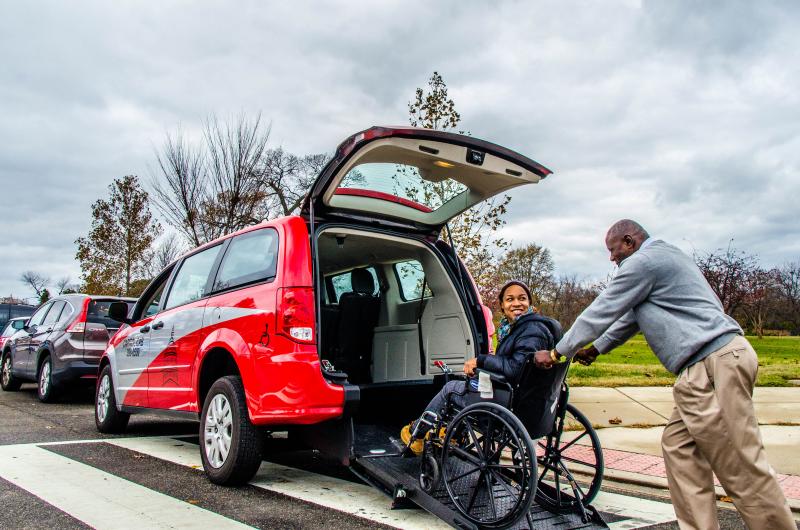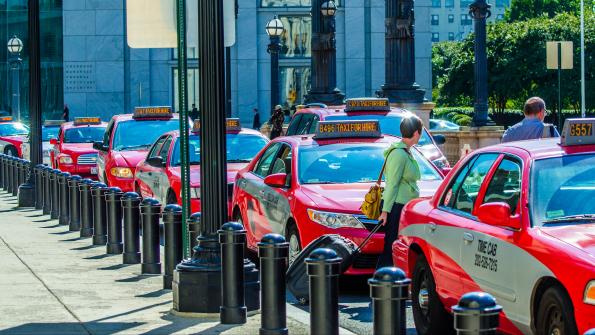Doing good is good business
By Neville Waters, DC Taxicab Commission
Public transportation can create challenges for any commuter, but for wheelchair-bound passengers in Washington, D.C., the systems in place were especially limited and burdensome. To ensure all residents had equal access to transit services, a local coalition of members of the Metropolitan Washington Council of Governments established rollDC, a pilot program to place 20 wheelchair accessible vehicles (WAVs) in service through two district taxicab companies. Now, the district is uniting with the DC Taxicab Commission (DCTC) to pilot a similar program.
Funded through a Federal Transit Administration grant, rollDC ensured WAVs were available to serve on a 24-hour-a-day, seven-day-a-week basis, to provide on-demand, point-to-point taxi service for mobility device users. Prior to rollDC, none of the 7,000+ taxis in local operation had such capabilities. MetroAccess, operated by the Washington Metropolitan Area Transit Authority (WMATA), was the one primary transportation option for residents and visitors who need ramp- or lift-equipped vehicles.
MetroAccess fares are less expensive than rollDC, but require riders to undertake a lengthy pre-registration process and book rides one day in advance. MetroAccess also follows a shared-ride model, which often means riders endure a longer trip to their respective destinations.
The DCTC believed that there was a business solution to the challenges associated with MetroAccess, and consulted with WMATA to discuss how to increase the number of WAVs on the district’s streets.
 The result of the discussions is the Coordinated Alternative to Paratransit Services pilot program that is marketed as CAPS-DC. The objective of the program is to transition ambulatory customers from MetroAccess to standard taxi service. Benefits of CAPS-DC include increasing the number of WAVs in the district’s overall taxi fleet, improving the overall transportation experience for program participants, adding new riders to the customer base of taxicab companies and saving taxpayers up to $2 million in subsidy payments to WMATA.
The result of the discussions is the Coordinated Alternative to Paratransit Services pilot program that is marketed as CAPS-DC. The objective of the program is to transition ambulatory customers from MetroAccess to standard taxi service. Benefits of CAPS-DC include increasing the number of WAVs in the district’s overall taxi fleet, improving the overall transportation experience for program participants, adding new riders to the customer base of taxicab companies and saving taxpayers up to $2 million in subsidy payments to WMATA.
CAPS-DC riders will see no increase in their out-of-pocket expense as compared to MetroAccess and will receive point-to-point transportation without the multiple stops. Residents can book a ride with one hour’s notice. A companion can ride at no charge and two participants may ride together to the same location for no additional charge.
“The financial impact of CAPS-DC is a reduction of total costs by 59 percent as compared to MetroAccess,” says Karl Muhammad, ADA manager for the DCTC.
WMATA transferred 33 WAVs to qualified taxicab companies for initial use with the CAPS-DC program. The participating taxicab companies will purchase new WAVs for every 3,000 rides taken via CAPS-DC. It is projected that 55 to 60 WAVs will be added to the district’s fleet in the first year.
“This pilot project will offer users a higher quality level of service,” says DCTC Chairman Ron M. Linton. “CAPS-DC will allow participants to book rides easier without multiple stops; reduce the cost to district taxpayers; and increase the number of wheelchair accessible vehicles available to the public.”
In addition to the CAPS-DC pilot program, the DCTC added incentives to encourage adoption of more fuel-efficient, wheelchair-accessible vehicles by offering longer service years, extending use from seven years to up to 12 years. The ultimate goal of these programs, planners say, is to make D.C. a model city, with taxicab fleets comprised of 100 percent wheelchair-accessible vehicles.
_____________
To get connected and stay up-to-date with similar content from American City & County:
Like us on Facebook
Follow us on Twitter
Watch us on Youtube




















